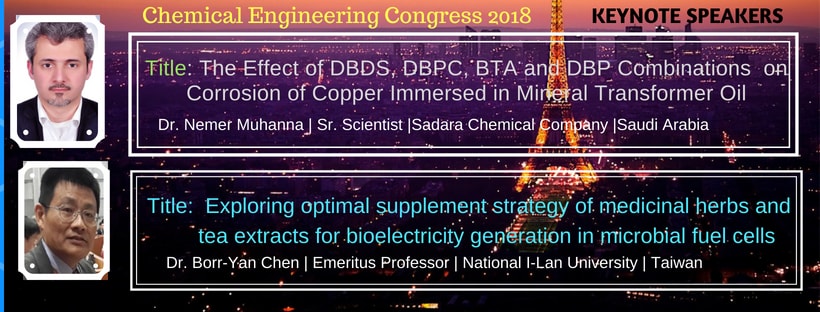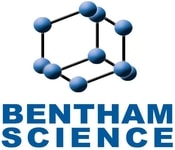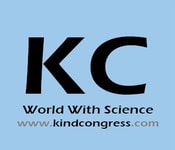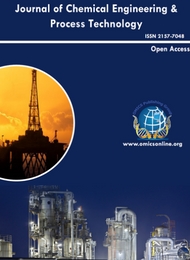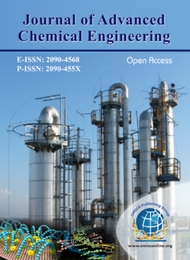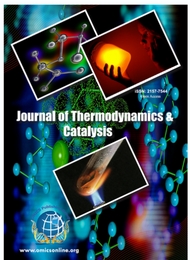Theme: Changing the World by Exploring Newer and Sustainable Technologies in Chemical Engineering.
Chemical Engineering Congress 2018
ConferenceSeries Ltd is proud to announce the 5th World Congress On Chemical Engineering and Catalysis 2018, which is to be held during August 28-30, 2018 at Paris, France.
On this great gathering, organizing committee invites participants from all over the globe to take part in this annual conference with the theme “Changing the world by Exploring Newer and Sustainable Technologies in Chemical Engineering”. Chemical Engineering Congress 2018 aims at sharing new ideas and new technologies amongst the professionals, industrialists and students from research areas of chemical engineering to share their recent innovations and applications and indulge in interactive discussions and technical sessions at the event. The conference will also have a space for companies and/or institutions to present their services, products, innovations and research results.
Chemical Engineering Congress 2018 involves the tracks like chemical engineering, advanced chemical engineering thermodynamics, Physical-organic chemistry, Chemical Reaction Engineering, Biotechnology and Biochemical engineering, Heat transfer and Mass transfer operations, fluid Mechanics, Material Science and Engineering, Polymer Science and Technology, Nano chemistry and Nanotechnology, Transport Phenomena and IPC, Modelling Simulation And Optimization, Industrial Safety and pollution control, Chemical Industry and Market Analysis.
Importance and Scope:
Chemical Engineering and Catalysis plays a vital role in our lives because of its uniqueness in properties and extended application in various industries. These are the basis of modern science and technology. Chemical Engineering is at the heart of many technological developments that touch our lives and find applications synthetic replacement for those resources as well as materials that are low in supply. In overall, it can be said that chemical engineers will be able to make very crucial contributions to the improvement in addition to the maintenance of the quality of our lives. Chemical Engineering techniques are used for the production of usable, high quality products such as fibres, fabrics, paints, medical drugs, biomaterials, gasoline, lubricants etc used in various industries such as textile, food, plastics, automotive, aerospace, petroleum, oil and gas, biomedical, biotechnology and pharmaceuticals, thereby increasing the scope of Chemical Engineering.
Why to attend???
Chemical Engineering Congress 2018 which is going to be the biggest conference dedicated to Chemical Engineering and Catalysis professionals providing a premier technical forum for reporting and learning about the latest new generation technologies developed during the course of time along with discussing their applications. Events include hot topics presentations from all over the world and professional networking with industries, leading working groups and panels.
Meet Your Objective Business sector With individuals from and around the globe concentrated on finding out about Chemical Engineering, this is the best chance to achieve the biggest collection of members from everywhere throughout the World. Conduct shows, disperse data, meet with current, make a sprinkle with another product offering, and get name acknowledgment at this occasion. Widely acclaimed speakers, the latest methods, strategies, and the most up to date overhauls in Chemical Engineering are signs of this meeting.
Target Audience:
- Professors.
- Scientists.
- Research Scholars and students
- Nanotechnology Companies
- Chemical Related Companies
- Biotech Related professors
- Biotech Related Companies
- Biotech Companies Staff
- Nanotechnology Associations
- Advanced Materials and Nanotechnology Engineers
- Pharma Companies
- Cement Companies Staff
Track 1: Chemical Engineering: A Unit Operation
Chemical Engineering is a multi-disciplinary branch of engineering in which Designing, manufacturing and operating plants and machinery for carrying out large-scale industrial, chemical, biological or related processes or Developing new substances for a wide range of products combines natural and experimental sciences (such as chemistry and physics), along with life sciences (such as biology, microbiology and biochemistry) plus mathematics and economics to design, develop, produce, transform, transport, operate and manage the industrial processes that turn raw materials into valuable products.
Many of the processes within chemical engineering involve chemical reactions, and the field takes cues from chemists who are looking for new ways to create products and to investigate the mechanisms within chemical reactions. Chemical engineers then translate this chemical information to formulate designs.
Chemical engineers may be specialized in one or the other subgroup, but work from both side will be required in order to create a final product. They will need to consider economic viability, management of resources, health and safety, sustainability and environmental impact.
Related Conferences
6th International Conference on Petroleum Engineering, June 29-July 01, 2017, Madrid, Spain; 7th World Congress on Petro chemistry and Chemical Engineering, November 13-15, 2017, Atlanta, USA; 6thInternational Congress on Biofuels, Bioenergy and Bioeconomic, December 04-06-2017, Sao Paulo, Brazil; 5thInternational Congress on Biofuels and Bioenergy, October 2-4, 2017, Toronto, Canada; Polymer Science Conferences, May 8-9, 2017 Barcelona, Spain; 2nd World Biodiesel Congress & Expo, December 7-9, 2017 Atlanta, USA; 6th International Conference on Chemistry and Chemical Process February 01-02, 2017 Italy, Rome; 18th International Conference on Chemical Engineering and Process Technology, Istanbul, Turkey, January 25-26, 2017; 4th Annual International Conference on Chemistry, Chemical Engineering and Chemical Process, 18-19 January 2017,Singapore; The European Society for Biochemical Engineering Sciences September 11-14 2017; 18th International Conference on Polymeric Materials Science and Technology, Dubai, UAE, March 15 - 16, 2017.
Related societies and associations
Society of Chemical Engineers, Thai Institute of Chemical Engineering and Applied Chemistry, Renewable Fuels Association, World Bioenergy Association, AEBIOM European Bioenergy Association, The Bioenergy Association of Finland.
Track 2: Process Heat Transfer
Heat Transfer is the process of transfer of heat from high temperature reservoir to low temperature reservoir. In terms of the thermodynamic system, heat transfer is the movement of heat across the boundary of the system due to temperature difference between the system and the surroundings. The heat transfer can also take place within the system due to temperature difference at various points inside the system. The difference in temperature is ‘potential’ that causes the flow of heat and the heat itself is called as flux.
Heat exchangers are devices built for efficient heat transfer from one fluid to another. They are widely used in engineering processes and include examples such as intercoolers, preheaters, boilers and condensers in power plants. Heat exchangers are becoming more and more important to manufacturers striving to control energy costs.
Related Conferences
6th International Conference on Petroleum Engineering, June 29-July 01, 2017, Madrid, Spain; 7th World Congress on Petro chemistry and Chemical Engineering, November 13-15, 2017, Atlanta, USA; 6thInternational Congress on Biofuels, Bioenergy and Bioeconomy, December 04-06-2017, Sao Paulo, Brazil; 5thInternational Congress on Biofuels and Bioenergy, October 2-4, 2017, Toronto, Canada; Polymer Science Conferences, May 8-9, 2017 Barcelona, Spain; 2nd World Biodiesel Congress & Expo, December 7-9, 2017 Atlanta, USA; 6th International Conference on Chemistry and Chemical Process February 01-02, 2017 Italy, Rome; 18th International Conference on Chemical Engineering and Process Technology, Istanbul, Turkey, January 25-26, 2017; 4th Annual International Conference on Chemistry, Chemical Engineering and Chemical Process, 18-19 January 2017,Singapore; The European Society for Biochemical Engineering Sciences September 11-14 2017; 18th International Conference on Polymeric Materials Science and Technology, Dubai, UAE, March 15 - 16, 2017.
Related societies and associations
Society of Chemical Engineers, Thai Institute of Chemical Engineering and Applied Chemistry, Renewable Fuels Association, World Bioenergy Association, AEBIOM European Bioenergy Association, The Bioenergy Association of Finland.
Track 3: Chemical Reaction Engineering and Catalysis
Chemical Reaction Engineering and Catalysis is the field that studies the rates and mechanisms of chemical reactions and the design of the reactors in which they take place. Every industrial chemical process is designed to produce economically a desired product from a variety of starting materials through a succession of treatment steps.
Related Conferences
International Conference on Chemical and Biochemical Engineering, June 7-8, 2017 Milan, Italy; International Conference on Renewable Energy and Resources, July 24-26, 2017, Vancouver, Canada; Polymer Science Conferences, May 8-9, 2017 Barcelona, Spain ; 7th World Congress on Petrochemistry and Chemical Engineering, November 13-15, 2017, Atlanta, USA; 3rd Annual Congress and Expo on Biofuels and Bioenergy, April 27-28, 2017 Dubai, UAE; 2nd Euro Global Summit and Expo on Biomass, September 28-29, 2017 Madrid, Spain; 23rd International Congress on chemical and process Engineering August 14-16 2017, Prague, Czech Republic; The International Conference on Advances in Bioprocess Engineering and Technology, January 16-18 2017, Kolkata, India; 15th International Conference on Chemical and Biochemical Engineering Beijing, China March 20-22, 2017; The 16th International Meeting on Chemical Sensors July 17–19, 2017 ,Ramada Plaza Jeju, Jeju Island, Korea.
Related societies and associations
Israel Institute of Chemical Engineers (IIChe), American Chemical Society, Joint Bio Energy Institute Sandia National Laboratories , Bioenergy Association of New Zealand, Biomass Power Association.
Track 4: Mass Transfer As Separation Processes
The drivivng forcec for mass transfer is typically a difference in chemical potential, when it can be defined, though other thermodynamic gradients may couple to the flow of mass and drive it as well. A chemical species moves from areas of high chemical potential to areas of low chemical potential. Mass transfer is used by different scientific disciplines for different processes and mechanisms. Mass transfer occurs in many processes, such as absorption, evaporation, drying, Crysatllization, membrane filtration, and distillation. Distillation is a widely used method for separating mixtures based on differences in the conditions required to change the phase of components of the mixture. Absorption is the process in which a fluid is dissolved by a liquid or a solid (absorbent). Adsorption is the process in which atoms, ions or molecules from a substance (it could be gas, liquid or dissolved solid) adhere to a surface of the adsorbent.
Related Conferences
7th World Congress on Petro chemistry and Chemical Engineering, November 13-15, 2017, Atlanta, USA; International Conference on Chemical and Biochemical Engineering, June 7-8, 2017 Milan, Italy; 5thInternational Congress on Biofuels and Bioenergy, October 2-4, 2017, Toronto, Canada; Polymer Science Conferences, May 8-9, 2017 Barcelona, Spain; 5th International Conference and Exhibition on Biopolymers and Bio plastics, October 19-21, 2017, San Francisco, USA; International Conference on Renewable Energy and Resources, July 24-26, 2017, Vancouver, Canada; 6th International Conference on Chemistry and Chemical Process 01 - 02 February 2017 Italy, Rome; 18th International Conference on Chemical Engineering and Process Technology, Istanbul, Turkey, January 25 - 26, 2017; 4th Annual International Conference on Chemistry Chemical Engineering and Chemical Process, 18 - 19 January 2017,Singapore; 22nd International congress on chemical and process Engineering 2017, 28-31 August, Prague, Czech Republic; 67thAnnual Meeting of the International Society of Electro Chemistry 21-26 August, 2017 The Hague, The Netherlands.
Related societies and associations
Brazilian Association of Chemical Engineering, Colombian Association of Chemical Engineering, Environmental and Energy Study Institute, American Biomass Association, Bioenergy Association of California, American Solar Energy Society (ASES).
Track 5: Fluid Mechanics in Industries
Fluid Mechanics is the branch of science that studies the behaviour of fluids when they are in state of motion or rest. Whether the fluid is at rest or motion, it is subjected to different forces and different climatic conditions and it behaves in these conditions as per its physical properties. Fluid mechanics deals with three aspects of the fluid: static, kinematics, and dynamics aspects. Industrial Applications of Fluids.
Related Conferences
3rd Annual Congress and Expo on Biofuels and Bioenergy, April 27-28, 2017 Dubai, UAE; 2nd World Bioenergy Congress and Expo, June 29-30, 2017, Madrid, Spain; 2nd World Biodiesel Congress & Expo, December 7-9, 2017 Atlanta, USA; 2nd Euro Global Summit and Expo on Biomass, September 28-29, 2017 Madrid, Spain; Polymer Science Conferences, May 8-9, 2017 Barcelona, Spain; 5th International Conference and Exhibition on Biopolymers and Bio plastics, October 19-21, 2017, San Francisco, USA; 7th World Congress on Petrochemistry and Chemical Engineering, November 13-15, 2017, Atlanta, USA; 18th International Conference on Combustion, Energy Utilisation and Thermodynamics, Paris, France, January 21-22, 2017; 18th International Conference on Fluid Dynamics and Thermodynamics, January 18-19,2017, London, UK; 21stEuropean Conference on Thermophysical Properties September 3-8, 2017, Austria, Graz; 24th Chemical Thermodynamics Conference August 21st to 26th 2017.
Related Societies and Associations
Association of Chemical Engineers of Uruguay, Czech Society of Chemical Engineering, American Biofuels Council, American Council on Renewable Energy, Bioenergy Crop Research Institute, National Institute of Crop Science.
Track 6: Mechanical Operations
Around 75% of Chemical manufacturing processes involve small solid particles at some point. Proper design and handling of these fine particles often makes the difference between success and failure of the product. Many products such as catalysts, pigments, fertilizers, cements, ceramics and pharmaceuticals are currently manufactured in particulate forms. Mechanical Operations deal with Science and Technology of particulate matter, which is a multidisciplinary field including Materials Science, Environmental, Biomedical, Aerospace, Agricultural, Chemistry, Microbiology and Cell Science, Pharmacy and Medicine. Mechanical operations are those unit operations that involve physically changing a material. Although this generally refers to a change in size (reduction or enlargement) or shape, it is not limited to that. Mechanical operations also include separation of material based on physical/mechanical properties like density, size, wettability, etc.
6th International Conference on Petroleum Engineering, June 29-July 01, 2017, Madrid, Spain; International Conference on Chemical and Biochemical Engineering, June 7-8, 2017 Milan, Italy; 6th International Congress on Biofuels, Bioenergy and Bio economy, December 04-06-2017, Sao Paulo, Brazil; Polymer Science Conferences, May 8-9, 2017 Barcelona, Spain; 6th International Conference on Chemistry and Chemical Process 01-02 February 2017 Italy, Rome; 18th International Conference on Chemical Engineering and Process Technology, Istanbul, Turkey, January 25-26, 2017; 4th Annual International Conference on Chemistry, Chemical Engineering and Chemical Process, 18-19 January 2017,Singapore;; 18th International Conference on Polymeric Materials Science and Technology, March 15 - 16, 2017 Dubai, UAE.
Related Societies and Associations
Argentinian Association for Chemical Engineers, Indian Institute of Chemical Engineers (IIChe), Bio Energy Council of India, Central Leather Research Institute (CSIR), Bioenergy Association of New Zealand, Asia-Pacific Biomass Energy Technology
Track 7: Chemical Engineering Thermodynamics
In general change of state of a thermodynamic system results from existence of gradients of various types within or across its boundary. Thus, a gradient of pressure results in momentum or convective transport of mass. Temperature gradients result in heat transfer, while a gradient of concentration promotes diffusive mass transfer. Thus, if internal or cross-boundary gradients of any form as above exist with respect to a thermodynamic system it will undergo change of state in time. The result of all such changes is to annul the gradient that in the first place causes the changes. This process will continue till all types of gradients are nullified.
Related Conferences
6th International Congress on Biofuels, Bioenergy and Bio economy, December 04-06-2017, Sao Paulo, Brazil; 5th International Conference on Bioprocess and Bio Therapeutics, September 25-27 2017, Jackson Ville, USA; 2nd World Biodiesel Congress & Expo, December 7-9, 2017 Atlanta, USA; 2nd World Bioenergy Congress and Expo, June 29-30, 2017, Madrid, Spain; 3rd Annual Congress and Expo on Biofuels and Bioenergy, April 27-28, 2017 Dubai, UAE; Polymer Science Conferences, May 8-9, 2017 Barcelona, Spain; The International Conference on Advances in Bioprocess Engineering And Technology, 20-22 January 2017, Kolkata, India; 15th International Conference on Chemical and Biochemical Engineering Beijing, China March 10, 2017; The 16th International Meeting on Chemical Sensors July 10–13, 2017 ,Ramada Plaza Jeju, Jeju Island, Korea; The European Society for Biochemical Engineering Sciences 11-14 September 2017; 24th Chemical Thermodynamics Conference August 21st to 26th 2017; 22nd International congress on chemical and process Engineering 2017,28-31 August, Prague, Czech Republic.
Related Societies and Associations
World Chemical Engineering Council, Brazilian Association of Chemical Engineering, Bio Energy Association, World Biogas Association, Society of Agricultural and Biological Engineers, America American Chemical Society, America
Track 8: Physical Organic Chemistry
Physical Organic Chemistry is the study of the relationship between structure and reactivity of organic molecules. More specifically, physical organic chemistry applies the experimental tools of physical chemistry to the study of the structure of organic molecules and provides a theoretical framework that interprets how structure influences both mechanisms and rates of organic reaction.
Related Conferences
3rd Annual Congress and Expo on Biofuels and Bioenergy, April 27-28, 2017 Dubai, UAE; 6th International Conference on Petroleum Engineering, June 29-July 01, 2017, Madrid, Spain; 5th International Congress on Biofuels and Bioenergy, October 2-4, 2017, Toronto, Canada; Polymer Science Conferences, May 8-9, 2017 Barcelona, Spain; 4th World Congress on Biopolymers, September 7-9, 2017, Paris, France; 5th International Conference on Bioprocess and Bio Therapeutics, September 25-27 2017, Jackson Ville, USA; 7th World Congress on Petrochemistry and Chemical Engineering, November 13-15, 2017, Atlanta, USA; 6thInternational Conference on Chemistry and Chemical Process 01-02 February 2017 Italy, Rome; 18thInternational Conference on Chemical Engineering and Process Technology, Istanbul, Turkey, January 25-26, 2017; 4th Annual International Conference on Chemistry, Chemical Engineering and Chemical Process, 18-19 January 2017,Singapore; The European Society for Biochemical Engineering Sciences 11-14 September 2017; 18th International Conference on Polymeric Materials Science and Technology, March 15 - 16, 2017 Dubai, UAE.
Related Societies and Associations
Bio Energy Council of India, Canadian Society for Chemical Engineering (CSChE), Society of Chemical Engineers New Zealand, Belgian Society of Biochemistry Belgium, Canadian Society for Chemical Technology.
Track 9: Biotechnology And Biochemical Engineering
Biotechnology is the use of living systems and organisms to develop or make products, or "any technological application that uses biological systems, living organisms, or derivatives thereof, to make or modify products or processes for specific use.
Biochemical Engineering is an essential area in modern biotechnology. Biochemical Engineering includes Bioreactor and fermenter design aspects, Industrial biotechnology, Photo Bioreactor Electrochemical Energy Conversion, Biological Hydrogen production (Algae), Biofuel from algae, Bioreactor landfill, and Moss bioreactor.
Biochemical Engineers translate exciting discoveries in life sciences into practical materials and processes contributing to human health and well-being. Biochemical engineering is mainly deals with the design and construction of unit processes that involve biological organisms or molecules, such as bioreactors. Its applications are in the petrochemical industry, food, pharmaceutical, biotechnology, and water treatment industries.
Related Conferences
2nd International conference on Biomass, September 28-29, 2017, Madrid, Spain; 15th world Congress on Biotechnology and Biotech Industries Meet, March 20-21, 2017 Rome, Italy; World Congress on Biopolymers, September 7-9, 2017, Paris, International Conference on Renewable Energy and Resources, July 24-26, 2017 Vancouver, Canada; International Conference on Biopharmaceutical and life sciences, January 19-20, 2017 London UK; International Conference on Molecular Biology and Genetic Engineering, May 25-26, 2017 London, UK; International conference on Industrial Biotechnology, July 23-26, 2017 Montreal, Canada; 15th International Conference on Biotechnology and Biotech Industries, March 20-21, 2017 Rome, Italy
Related Societies and Associations
The Royal Australian Chemical Institute, International Plasma Chemistry Society, Belgian Society of Biochemistry Belgium, Canadian Society for Chemical Technology Canada, Chinese-American Chemical Society China, Society of Chemical Engineers New Zealand.
Track 10: Environmental Engineering and Elementary Biology
Environmental Engineering and Elementary Biology is something that you can get a degree in these days, but the field is one that existed long before it had a name, begun at the dawn of civilization when we started modifying our environment to meet our needs. It involves applying science and engineering practices to how we utilize and impact our natural resources. Modern environmental engineers work on solutions to issues like pollution reduction and clean-up, energy consumption and emissions, land erosion, water treatment and waste management to properly manage and maintain the quality of our soil, water and air. They strive to keep everyone healthier and happier by helping us live off the land more efficiently and less destructively. Environmentally Benign Catalysis: Over the past 22 years, Catalysis by Heteropolyacids (HPAs) has received wide attention and led to new and promising developments both at academic and industrial level. Heterogeneous catalysis is particularly attractive because it generally satisfies most of green chemistry’s requirements. By emphasizing the development of third generation catalysts, this volume presents trends and opportunities in academic and industrial research. Dealing with Low-pressure oxidative carbonylation of aniline, Clean combustion (catalyst challenges) and Zeolite technologies for a greener environment, this Conference appeals to postgraduates, researchers, and chemists working in the field of environmentally benign catalysts as well as catalytic processes.
Related Conferences
5th International Bio plastics Conference, July 20-21, 2017 Munich, Germany; 7th International Biofuels & Bioenergy Conference, October 2-4, 2017 Toronto, Canada; 2nd World Biodiesel Congress, December 4-5, 2017 Atlanta, USA; 6thWorld Biopolymers Congress, September 7-9, 2017 Paris, France; 3rd International Chemical Engineering Conference, October 2-4, 2017 Chicago, USA; 7th International Biopolymers-Bio plastics Conference, October 19-21, 2017 San Francisco, USA; 6th International Petroleum Engineering Conference, June 29-30, 2017 Madrid, Spain; 2ndInternational Petroleum Conference, June 1-3, 2017 Osaka, Japan;3rd International oil and gas expo, July 13-14, 2017 Berlin, Germany; International Oil, Gas and Petro chemistry Conference, April 03-05, 2017 DUBAI, UAE; 4th Annual Biofuels Congress, April 27-28, 2017 Dubai, UAE; 2nd International Biochemical Engineering Conference, June 7-8, 2017 Milan, Italy; 5th World Bioenergy Congress, June 29-30, 2017 Madrid, Spain; 4th International Petrochemical Engineering Conference, January 21-23, 2017 Bangkok, Thailand; Energy, Power and Petrochemical Engineering Conference, April 26-28, 2017, Beirut, Lebanon; Geologists;
Related Societies and Associations
American Association of Petroleum, the European Petrochemical Association, Society of Petroleum Engineers, European Polymer Federation, British Plastics Federation, Belgian Society of Biochemistry.
Track 11: Crystallization
The crystallization process consists of two major events, nucleation and crystal growth which are driven by thermodynamic properties as well as chemical properties. Crystallization, the process of solidifying from solution, is highly complex. Seed particles or nuclei form in the solution and other molecules then deposit on these solid surfaces. Crystallization is based on the principles of solubility: compounds (solutes) tend to be more soluble in hot liquids (solvents) than they are in cold liquids. If a saturated hot solution can cool, the solute is no longer soluble in the solvent and forms crystals of pure compound. Impurities are excluded from the growing crystals and the pure solid crystals can be separated from the dissolved impurities by filtration.
Many compounds have the ability to crystallize with some having different crystal structures, a phenomenon called polymorphism. The DTB crystallizer has an internal circulator, typically an axial flow mixer – yellow – pushing upwards in a draft tube while outside the crystallizer there is a settling area in an annulus; in it the exhaust solution moves upwards at a very low velocity, so that large crystals settle and return to the main circulation while only the fines, below a given grain size are extracted and eventually destroyed by increasing or decreasing temperature, thus creating additional supersaturation.
Related Conferences
World Congress On Petroleum and Refinery, July 21-23 2016, Brisbane, Australia; Mining and Metallurgy Conference June 27-29 2016, Cape Town, South Africa; 2nd International Conference on Green Energy & Expo November 28-30 2016, Chicago, USA; 2nd Global Geologists Annual Meeting, July 11-12 2016, Brisbane, Australia; 2nd Oil and Gas Conference, November 10-12 2016, Istanbul, Turkey; Pipeline Pigging & Integrity Management Conference February 08-11 2016, Houston, USA; ARC Industrial Petroleum Conference February 08-11 2016, Orlando Florida; International Petroleum (IP) Week February 09-11 2016, London, UK; NA Petroleum Engineering Summit February 09-12 2016, Houston, USA; SPE Hydraulic Fracturing Technology Conference & Exhibition February 09-11 2016, USA.
Related Societies and Associations
The polymer society, Polymer processing society, European Polymer Federation, The European Petrochemical Association, Society of Petroleum Engineers, British Plastics Federation.
Track 12: Mass Spectrometry
Mass Spectrometry is the powerful analytical technique used to quantify known materials, to identify unknown compounds within a sample, and to elucidate the structure and chemical properties of different molecules. The complete process involves the conversion of the sample into gaseous ions, with or without fragmentation, which are then characterized by their mass to charge ratios (m/z) and relative abundances.
This technique basically studies the effect of ionizing energy on molecules. It depends upon chemical reactions in the first step in the mass spectrometric analysis of compounds is the production of gas phase ions of the compound, basically by electron ionization. This molecular ion undergoes fragmentation. Each primary product ion derived from the molecular ion, in turn, undergoes fragmentation, and so on gas phase in which sample molecules are consumed during the formation of ionic and neutral species.
Related Conferences
World Congress On Petroleum and Refinery, July 21-23 2016, Brisbane, Australia; Mining and Metallurgy Conference June 27-29 2016, Cape Town, South Africa; 2nd International Conference on Green Energy & Expo November 28-30 2016, Chicago, USA; 2nd Global Geologists Annual Meeting, July 11-12 2016, Brisbane, Australia; 2nd Oil and Gas Conference, November 10-12 2016, Istanbul, Turkey; Pipeline Pigging & Integrity Management Conference February 08-11 2016, Houston, USA; ARC Industrial Petroleum Conference February 08-11 2016, Orlando Florida; International Petroleum (IP) Week February 09-11 2016, London, UK; NA Petroleum Engineering Summit February 09-12 2016, Houston, USA; SPE Hydraulic Fracturing Technology Conference & Exhibition February 09-11 2016, USA.
Related Societies and Associations
The polymer society, Polymer processing society, European Polymer Federation, The European Petrochemical Association, Society of Petroleum Engineers, British Plastics Federation.
Track 13: Electrochemistry And Electrochemical Engineering
Electrochemical Engineering combines the study of heterogeneous charge transfer at electrode/electrolyte interphases with the development of practical materials and processes. Fundamental considerations include electrode materials and the kinetics of redox species. Electrochemical Engineering is applied in industrial water electrolysis, electrolysis, electrosynthesis, electroplating, fuel cells, flow batteries, decontamination of industrial effluents, electrorefining, electrowinning.
Many natural phenomena are depend on Electrochemical Methods, such as the corrosion of metals, the ability of some sea creatures to produce electrical fields, and the workings of the nervous systems of humans and other animals. They also play an important part in modern Chemical technology, most prominently in the storage of electrical power in batteries, and the electrochemical process called electrolysis is important in modern industry. Neurons use electrochemical processes to transmit data through the nervous system, allowing the nervous system to communicate with itself and with the rest of the body. The electrochemical instruments market is segmented on the basis of products, methodologies, end user, and region. The global electrochemical instruments market was valued at $1,713.0 Million in 2014 and is poised to increase at a CAGR of 5.2% during the forecasted period.
The methods of each Electrochemical instrument are accomplished for a specific purpose they are all bound together by fundamental principles that govern the operation. Collectively known as the principles of Electrochemical Engineering includes transport processes, current and potential distribution phenomena, thermodynamics, kinetics, scale-up, sensing, control, and optimization.
Related Conferences
World Congress and Expo on Expo on Recycling July 25-27 2016, Berlin, Germany; 4th Global Summit on Geosciences October 06-07 2016, Miami, USA; Euro Global Summit and Expo on Biomass August 01-03 2016, Birmingham, UK; 4th International Conference on Bioprocess and Bio systems Engineering, October 20-21, 2016 Houston , USA; 2nd International Congress and Expo on Biofuels & Bioenergy, September 01-03, 2016 Sao Paulo, Brazil; IADC Drilling Africa Conference & Exhibition February 15-16 2016, Cape Town, South Africa; Australasian Oil & Gas Exhibition & Conference February 24-26 2016, Perth, Australia; IADC/SPE Drilling Conference March 01-03 2016, USA; Global Oil & Gas Turkey March 16-17 2016, Ankara, Turkey; Offshore Technology Conference-Asia March 22-25 2016, Kuala Lumpur , Malaysia.
Related Societies and Associations
Federation of European Biochemical Societies, British Plastics Federation, The polymer society, Polymer processing society, American Chemical Society, American Physical Society.
Track 14: Material Science And Engineering
Material Science and Engineering involves the discovery and design of new materials. Many of the most pressing scientific problems humans currently face is due to the limitations of the materials that are available and, as a result, major breakthroughs in materials science are likely to affect the future of technology significantly. Materials scientists lay stress on understanding how the history of a material influences its structure, and thus its properties and performance. All engineered products from airplanes to musical instruments, alternative energy sources related to ecologically-friendly manufacturing processes, medical devices to artificial tissues, computer chips to data storage devices and many more are made from materials. The intellectual origins of materials science stem from the Enlightenment, when researchers began to use analytical thinking from chemistry, physics, and engineering to understand ancient, phenomenological observations in metallurgy and mineralogy.
The interdisciplinary field of Materials Science, also commonly termed Materials Science and Engineering, involves the discovery and design of new materials, with an emphasis on solids. The intellectual origins of materials science stem from the Enlightenment, when researchers began to use analytical thinking from chemistry, physics, and engineering to understand ancient, phenomenological observations in metallurgy and mineralogy.
Related Conferences
World Congress and Expo on Expo on Recycling July 25-27 2016, Berlin, Germany; 4th Global Summit on Geosciences October 06-07 2016, Miami, USA; Euro Global Summit and Expo on Biomass August 01-03 2016, Birmingham, UK; 4th International Conference on Bioprocess and Bio systems Engineering, October 20-21, 2016 Houston , USA; 2nd International Congress and Expo on Biofuels & Bioenergy, September 01-03, 2016 Sao Paulo, Brazil; IADC Drilling Africa Conference & Exhibition February 15-16 2016, Cape Town, South Africa; Australasian Oil & Gas Exhibition & Conference February 24-26 2016, Perth, Australia; IADC/SPE Drilling Conference March 01-03 2016, USA; Global Oil & Gas Turkey March 16-17 2016, Ankara, Turkey; Offshore Technology Conference-Asia March 22-25 2016, Kuala Lumpur , Malaysia.
Related Societies and Associations
Federation of European Biochemical Societies, British Plastics Federation, The polymer society, Polymer processing society, American Chemical Society, American Physical Society.
Track 15: Nano-Chemistry and Nanotechnology
Nano-Chemistry be characterized by concepts of size, shape, self-assembly, defects and bio-Nano; So, the synthesis of any new Nano-construct is associated with all these concepts. Nano-construct synthesis is dependent on how the surface, size and shape will lead to self-assembly of the building blocks into the functional structures; they probably have functional defects and might be useful for electronic, photonic, medical or bioanalytical problems. Nano Materials and Nanoparticle examination is right now a region of serious experimental exploration, because of a wide range of potential applications in biomedical, optical, and electronic fields. Nanotechnology is helping to considerably develop, even revolutionize, different technology and industry sectors: information technology, Renewable energy, environmental science, medicine, homeland security, food safety, and transportation, among others. Regenerative nanomedicine is one of the medical applications of nanotechnology. It ranges from the medical applications of nanomaterials to Nanoelectronics biosensors, and the future applications of molecular nanotechnology, such as biological machines. Nanomedicine sales reached $16 billion in 2015, with a minimum of $3.8 billion in nanotechnology R&D being invested every year.
Related Conferences
World Congress On Petroleum and Refinery, July 21-23 2016, Brisbane, Australia; Mining and Metallurgy Conference June 27-29 2016, Cape Town, South Africa; 2nd International Conference on Green Energy & Expo November 28-30 2016, Chicago, USA; 2nd Global Geologists Annual Meeting, July 11-12 2016, Brisbane, Australia; 2nd Oil and Gas Conference, November 10-12 2016, Istanbul, Turkey; Pipeline Pigging & Integrity Management Conference February 08-11 2016, Houston, USA; ARC Industrial Petroleum Conference February 08-11 2016, Orlando Florida; International Petroleum (IP) Week February 09-11 2016, London, UK; NA Petrolium Engineering Summit February 09-12 2016, Houston, USA; SPE Hydraulic Fracturing Technology Conference & Exhibition February 09-11 2016, USA.
Related Societies and Associations
American Coatings Association, American Chemical Society, Nigerian Society of Chemical Engineers, Israel Institute of Chemical Engineers, French Society of Process Engineering, Korean Chemical Society.
Track 16: Polymer Science And Engineering
Polymer Science and Engineering is an engineering field that designs, analyses, or modifies polymer materials. A Polymer is a large molecule or a macro molecule which essentially is a combination of many sub units. The term polymer in Greek means ‘many parts’.
Polymers have the capacity to solve most of the world's complex problems like Water purification, energy management, oil extraction and recovery, advanced coatings, myriad biomedical applications, building materials, and electrical applications virtually no field of modern life would be possible without polymeric materials. Polymer chemistry is combining several specialized fields of expertise. It deals not only with the chemical synthesis, Polymer Structures and chemical properties of polymers which were esteemed by Hermann Staudinger as macromolecules but also covers other aspects of Novel synthetic and polymerization methods, Reactions and chemistry of polymers, properties and characterization of polymers, Synthesis and application of polymer bio conjugation and Polymer Nano composites and architectures. Polymers are a highly diverse class of materials which are available in all fields of engineering from avionics through biomedical applications, drug delivery system, bio-sensor devices, tissue engineering, cosmetics etc. and the improvement and usage of these depends on polymer applications and data obtained through rigorous testing. The application of polymeric materials and their composites are still increasing rapidly due to their below average cost and ease of manufacture.
Related Conferences
3rd World Congress on Petroleum and Refinery May 24-25, 2018, Singapore; 8th International Conference on Petroleum Engineering May 17-18, 2018 Rome, Italy; 10th International Conference and Expo on Oil and Gas September 17-19, 2018 Beijing, China; 20th International Conference on Petroleum and Petrochemical Engineering, September 27 - 28, 2018; SPE Hydraulic Fracturing Technology Conference and Exhibition, January 23 - 25 2018, Texas, USA; European Gas Conference 2018, January 29-31, 2018, Vienna, Austria; 20th International Conference on Oil, Gas and Petrochemical Engineering, March 5 - 6, 2018, Rome, Italy; 20th International Conference on Gas, Petroleum and Chemical Sciences May 3 - 4, 2018, Rome, Italy; 20th International Gas, Petroleum and Chemical Sciences and Technologies Conference, May 14 - 15, 2018, London, UK; 20th International Conference on Petroleum and Natural Gas Engineering October 29 - 30, 2018 Barcelona, Spain; 6th Asia Pacific Congress on Chemical and Biochemical Engineering, September 19-20, 2018 Macau, Hong Kong
Related Societies and Associations
Association for the Development of Biomaterials, The Scandinavian Society for Biomaterials, Polymer Division of the Royal Australian Chemical Institute, The polymer society, Polymer processing society
Track 17: Transport Phenomena And IPC
The study of Transport Phenomena concerns the exchange of mass, energy, charge, momentum and angular momentum between observed and studied systems. Transport phenomena involve fluid dynamics, heat transfer and mass transfer, which are governed mainly by momentum transfer, energy transfer and transport of chemical species respectively. Models often involve separate considerations for macroscopic, microscopic and molecular level phenomena. Modelling of transport phenomena requires therefore requires an understanding of applied mathematics. Transport phenomena have wide application. For example, in solid state physics, the motion and interaction of electrons, holes and phonons are studied under "transport phenomena". Another example is in biomedical engineering, where some transport phenomena of interest are thermoregulation, perfusion, and microfluidics. In chemical engineering, transport phenomena are studied in reactor design, analysis of molecular or diffusive transport mechanisms, and metallurgy.
Instrumentation is defined as the art and science of measurement and control of the process variables within a production or manufacturing area. The process variables used in industries are Level, Pressure, Temperature, Humidity, Flow, pH, Force, Speed etc
Control Engineering or control systems engineering is the engineering discipline that applies control theory to design systems with desired behaviours.
Instrumentation and Control plays a significant role in both gathering information from the field and changing the field parameters, and as such are a key part of control loops. The Instrumentation Technology, being an inter-disciplinary branch of engineering, is heading towards development of new & intelligent sensors, smart transducers, MEMS Technology, Blue tooth Technology.
Related Conferences
International Conference on Energy Resources and Renewable, July 24-25, 2017, Vancouver, Canada; Applied Energy 2017,Florida, USA; 4th Annual Congress on Biofuels and Bioenergy, April 27-28, 2017,Dubai, UAE; 7th International Congress on Biofuels and Bioenergy, October 2-4,2017,Toronto,Canada;2nd World Biodiesel Congress & Expo, December 4-5, 2017,Atlanta, USA; International Conference on Chemical Sciences and Technologies, January 08-09, 2017 Singapore; International Conference on Chemical Technologies and Green Chemistry, January 23-24 Paris, 2017;International Conference on Chemical, Biochemical and Process Engineering, January 08-09, 2017 Singapore; International Conference on Chemical, Biological and Environmental Engineering, January 30-31, 2017 Dubai; International Conference on Chemical and Ecological Environmental Sciences, January 19-20, 2017 London; What are the environmental impacts of biofuel production; Environmental Effects and Trade-offs of Biofuels Renewable Fuel.
Related Societies and Associations
Polymer Division of the Royal Australian Chemical Institute, Association for the Development of Biomaterials, Biochemical Society, Belgium,, Danish Chemical Society, Korean Chemical Society, Norwegian Chemical Society.
Track 18: Modelling Simulation And Optimization
Modelling and Simulation is the use of models – physical, mathematical, or otherwise logical representation of a system, entity, phenomenon, or process – as a basis for simulations – methods for implementing a model over time – to develop data as a basis for managerial or technical decision making. Using simulations is generally cheaper, safer and sometimes more ethical than conducting real-world experiments. Simulation-based optimization integrates optimization techniques into simulation analysis. Because of the complexity of the simulation, the objective function may become difficult and expensive to evaluate.
Once a system is mathematically modelled, computer-based simulations provide information about its behaviour. In physics-related problems, Monte Carlo methods are useful for simulating systems with many coupled degrees of freedom, such as fluids, disordered materials, strongly coupled solids, and cellular structures. Agent-based modelling is related to, but distinct from, the concept of multi-agent systems or multi-agent simulation in that the goal of ABM is to search for explanatory insight into the collective behaviour of agents obeying simple rules, typically in natural systems, rather than in designing agents or solving specific practical or engineering problems.
Related Conferences
9th Annual Congress and Expo on Biofuels and Bioenergy April 16-17, 2018 Dubai, UAE; 8th International Conference on Petroleum Engineering, May 17-18, 2018 Rome, Italy; 9th International Conference and Expo on Oil and Gas, Aug 09-10, 2018 Madrid, Spain; 5th World Congress on Chemical Engineering and Catalysis, August 27-28, 2018 Tokyo, Japan; 2nd International Conference on Renewable Energy and Resources, August 27-28, 2018 (10 Plenary Forums - 1Event) Boston, USA; 6th Asia Pacific Congress on Chemical and Biochemical Engineering, September 19-20, 2018 Macau, Hong Kong; 20th International Conference on Bioenergy and Bio refineries, April 23-24, Boston, USA; Bioenergy Ireland National Conference 2018 – Croke Park, Dublin, April 23 - 24, 2018, 10th Biofuels International Conference and Expo, October 4-5, 2017, Edinburg, UK; 20th International Conference on Biomass, Bioenergy, Biofuels and Bio products, January 8 - 9, 2018, Singapore
Related Societies and Associations
Biodiesel - America's first advanced biofuel, Advanced Biofuels Association, Bio Energy Association, World Biogas Association, Society of Agricultural and Biological Engineers, American Chemical Society.
Track 19: Industrial Safety And Pollution Control
Pollution is the introduction of contaminants into the natural environment that cause adverse change. Pollution can take the form of chemical substances or energy, such as noise, heat or light. Pollutants, the components of pollution, can be either foreign substances/energies or naturally occurring contaminants. Some of the more common soil contaminants are chlorinated hydrocarbons (CFH), heavy metals (such as chromium, cadmium–found in rechargeable batteries, and lead–found in lead paint, aviation fuel and still in some countries, gasoline. Pollution prevention describes activities that reduce the amount of pollution generated by a process, whether it is consumer consumption, driving, or industrial production. In contrast to most pollution control strategies, which seek to manage a pollutant after it is formed and reduce its impact upon the environment, the pollution prevention approach seeks to increase the efficiency of a process, thereby reducing the amount of pollution generated at its source. Although there is wide agreement that source reduction is the preferred strategy, some professionals also use the term pollution prevention to include pollution reduction. Few significant classifications of Pollution Control are Air Pollution Control, Air Quality, Emission Tax, Environmental Management, Environmental Policy,
An industrial safety system is a countermeasure crucial in any hazardous plants such as oil and gas plants and nuclear plants. They are used to protect human, industrial plant, and the environment in case of the process going beyond the allowed control margins. As the name suggests, these systems are not intended for controlling the process itself but rather protection. Process control is performed by means of process control systems (PCS) and is interlocked by the safety systems so that immediate actions are taken should the process control systems fail.
Related Conferences
6th Asia Pacific Congress on Chemical and Biochemical Engineering, September 19-20, 2018 Macau, Hong Kong; 9th Annual Congress and Expo on Biofuels and Bioenergy April 16-17, 2018 Dubai; UAE; 8th International Conference on Petroleum Engineering, May 17-18, 2018 Rome, Italy; 9th International Conference and Expo on Oil and Gas, Aug 09-10, 2018 Madrid, Spain; 5th World Congress on Chemical Engineering and Catalysis, August 27-28, 2018 Tokyo, Japan; 2nd International Conference on Renewable Energy and Resources, August 27-28, 2018 (10 Plenary Forums - 1Event) Boston, USA; 20th International Conference on Bioenergy and Biorefineries, April 23-24, Boston, USA; Bioenergy Ireland National Conference 2018 – Croke Park, Dublin, April 23 - 24, 2018, 10th Biofuels International Conference and Expo, October 4-5, 2017, Edinburg, UK; 20th International Conference on Biomass, Bioenergy, Biofuels and Bioproducts, January 8 - 9, 2018, Singapore.
Related Societies and Associations
Bio Energy Council of India, Asia-Pacific Biomass Energy Technology, Nigerian Society of Chemical Engineers, Israel Institute of Chemical Engineers, French Society of Process Engineering , Korean Chemical Society.
Track 20: Chemical Industry And Market Analysis
In the US there are 170 major chemical companies. They operate internationally with more than 2,800 facilities outside the U.S. and 1,700 foreign subsidiaries or affiliates operating. The U.S. chemical output is $750 billion a year. The U.S. industry records large trade surpluses and employs more than a million people in the United States alone. The chemical industry is also the second largest consumer of energy in manufacturing and spends over $5 billion annually on pollution abatement. In Europe the chemical, plastics and rubber sectors are among the largest industrial sectors. Together they generate about 3.2 million jobs in more than 60,000 companies. Since 2000 the chemical sector alone has represented 2/3 of the entire manufacturing trade surplus of the EU. The chemical industry has shown rapid growth for more than fifty years. The fastest growing areas have involved the manufacture of synthetic organic polymers used as plastics, fibres and elastomers. Historically and presently the chemical industry has 380 3134 13523 Companies Chicago USA Globe been concentrated in three areas of the world, Western Europe, North America and Japan (the Triad). The European Community remains the largest producer area followed by the US and Japan.
Related Conferences
7th International Biofuels and Bioenergy Congress October 2-4, 2017 Toronto, Canada; 3rd Annual Congress on Biofuels and Bioenergy April 27-28, 2017 Dubai, UAE; International Conference on Chemical and Biochemical Engineering June 7-8, 2017 Milano, Italy; International Conference on Renewable Energy and Resources July 24-26, 2017 Vancouver, Canada; 2nd World Congress on Biodiesel & Expo December 4-5, 2017 Atlanta, USA; 5th World Bioenergy Congress and Expo June 29-30, 2017 Madrid, Spain; 2nd Euro Global Biomass Summit October 12-13, 2017 London, UK; European Biomass Conference and Exhibition June 12-15, 2017 Stockholm, Sweden; 6th annual event on Global Energy Forum January 26-27, USA; 7th International Conference on Algal Biomass, Biofuels and Bio products June 18 - 21 2017 Miami, FL, USA; 6th International Conference on Bio refinery. The Chateau on the Park, January 18-21, 2017 Christchurch, New Zealand; 4th International Conference Progress in Biogas March 8-11 2017 in Stuttgart, Germany; 7th International Conference on Algal Biomass, Biofuels and Bio products June 18 - 21, 2017 Miami, FL, USA.
Related Societies and Associations
Advanced Biofuels USA Organizations Supporting Advanced Biofuels, World Biogas Association, Biochemical Society, Danish Chemical Society, Korean Chemical Society, Norwegian Chemical Society.
Chemical production in the European Union is expected to barely grow faster than in 2016. In general, the increase in production will remain modest against the backdrop of a sluggish domestic market. We expect competitive pressure on export markets to remain intense, even though the naphtha-based European chemical industry benefits more from low oil prices than the gas-based production in the United States.
In the United States, we expect somewhat faster growth in chemical production, at just under 2%, as new production capacity, which will also be used for export, comes onstream. Overall chemical growth is likely to decelerate somewhat in the emerging markets of Asia, mainly due to the slowdown in China, which will affect the other developing countries in the region. In Japan, we presume a weak overall economic environment and minimal growth in chemical production. In South America, the anticipated end of the recession in Argentina and Brazil will result in slight growth in chemical production in the region.

Figure 1: Chemical production Data
Materials Chemistry:
Today, many materials chemists are synthesizing functional device materials, and the discipline is often seen as directed towards producing materials with function—electrical, optical, or magnetic. Material chemistry is involved in the designing and processing of materials. Global market for catalysts is expected to reach $28.5 billion by 2020, growing at a CAGR (2015 to 2020) of over 3%. Asia-Pacific is having the largest market for catalysts accounting for more than 35% share.
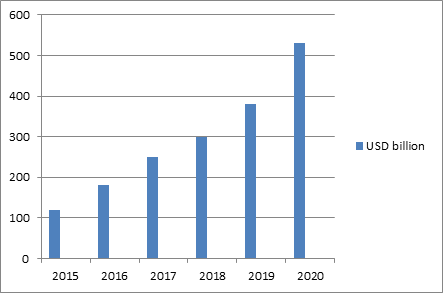
Figure 2: Growth forecast of material chemistry
Global Advanced CBRN Market:
The global chemical, biological, radiological, and nuclear (CBRN) security market is rising at a steady pace globally as demand for effective CBRN protection measures to combat terrorist attacks is at an all-time high. The threat of use of weapons of mass destruction by terrorist organizations have raised alarms to prevent possible attacks with CBRN systems. CBRN security is a rising market to address concerns related to protecting civilian lives and maintenance of economic stability.
In addition, CBRN systems are used for accidental incidents. These include events caused by human or technological errors such as accidental leaks or factory spillage of poisonous gas or liquids. Intentional CBRN incidents occur when CBRN materials are released into the environment with the intention of terrorism or war or when hazardous material is discharged into the environment deliberately.
One of the key factors driving the CBRN security market is increasing demand for CBRN security in developing countries such as India, China, and Brazil among others. In addition, African nations are expected to continue spending incessantly on CBRN surveillance systems to mitigate rising CBRN threats such as Ebola in the regaion. With continual technological advancements and increasing research initiatives worldwide, new-age CBRN security equipment are launched that primarily focus on government organizations, military, and law enforcement agencies.
Transparency Market Research estimates the global CBRN security market to be worth US$15074.8 mn by 2025 increasing from US$9890.0 mn in 2016, expanding at a CAGR of 4.8% between 2017 and 2025.
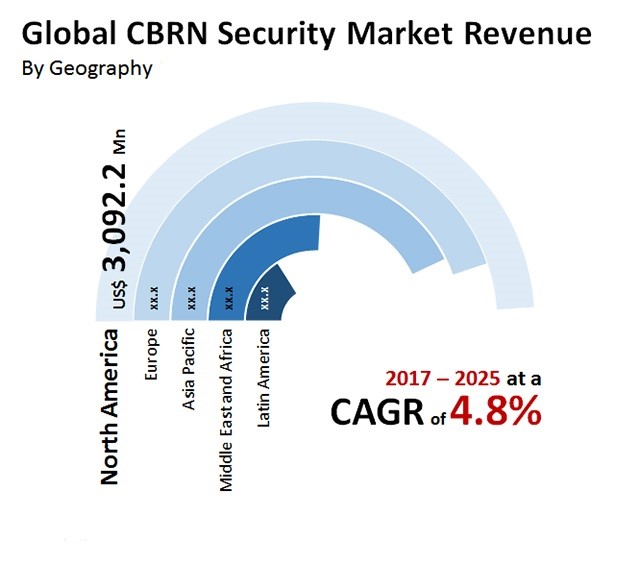
Figure 3: Global CNBR Security Market
Global Aroma Chemicals Market:
Aroma is a complex mixture of individual chemicals behaving according to their unique characteristics. These chemicals have several attributes such as polarity, volatility, stability, and surface activity among others. Among them, the chemicals with weight greater than 300 are called aroma chemicals. Perfumers use comprehensive palette of synthetic and natural aroma chemicals along with technical staff to create a peculiar commercial product.
Until a few years back, household care and personal care were the two primary segments exhibiting the demand for aroma chemicals. However, considering the latest research and development activities, the use of aroma chemicals has successfully penetrated medical and food and beverages industries. Spurred by this and efforts taken by the leading manufacturers to bolster product development and diversification, the global aroma chemicals market is forecast to exhibit a CAGR of 6.2% between 2016 and 2024. At this pace, the market’s valuation is expected to reach US$6.57 bn by the end of 2024. In 2015, the market was valued at US$3.85 bn.
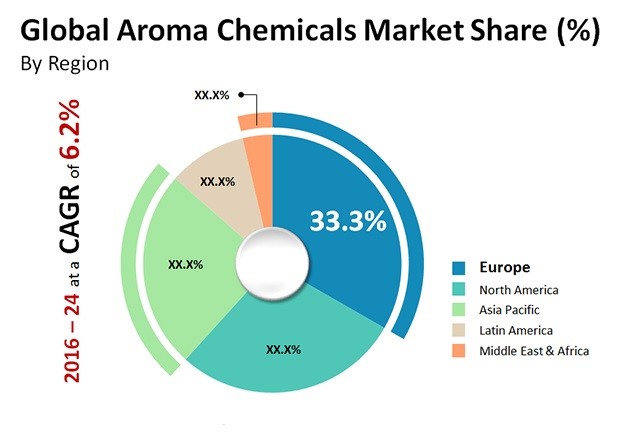
Figure 4: Global Aroma Chemicals Report
Global Steam Boiler Systems Market:
The global market for steam boiler systems is witnessing significant growth in its valuation, thanks to the rising demand for energy across the world. The augmenting need to improve energy efficacy of power plants and power generation process has been fueling the demand for steam boiler systems substantially. The rise in the government initiatives to encourage the usage of steam boiler systems, such as providing rebates and subsidies on their purchase, is also adding to the growth of this market remarkably. However, the high initial, as well as maintenance cost of these systems may limit their uptake, hindering the progress of this market soon.
In 2015, the global steam boiler systems market stood at US$12.0 bn. The opportunity in this market is likely to expand at a CAGR of 5.30% between 2016 and 2024 and is expected to reach US$18.9 bn by the end of 2024.
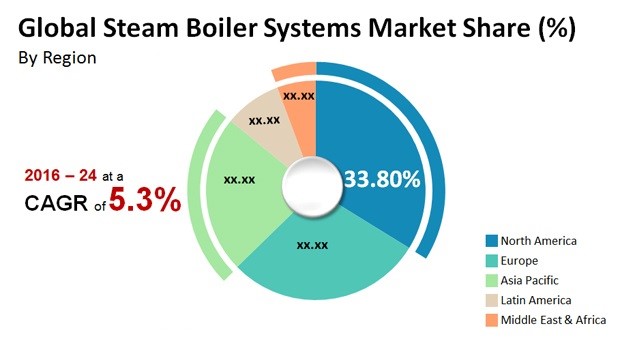
Figure 5: Global Steam Boiler Report
Chemical Engineering Congress 2016
Chemical Engineering-2016 Conference was the best!
International Conference on Chemical Engineering hosted by the ConferenceSeries was held during September 12-14, 2016 at Phoenix Airport Marriott, USA with the theme “Emerging technologies and scientific advancements in Chemical Engineering and its Applications". Active participation was received from the Editorial Board Members of OMICS Group Journals as well as from the scientists, researchers, students and leaders from the fields of Chemical Engineering, who made this event successful.
The meeting was carried out through various sessions, in which the discussions were held on the following major scientific tracks:
Advances in Chemical & Process Engineering
Advances in renewable chemicals
Thermodynamics
Separation process
Chemical Polymer Technology
Petroleum Refining and Petrochemicals
Applications of Chemical Technology
Biomolecular Engineering
Electrochemical Engineering
Biochemical engineering
Renewable energy & Environment
The conference was initiated with a series of lectures delivered by both Honorable Guests and members of the Keynote forum. The list included:
Ravindra Pogaku, University Malaysia Sabah (UMS), Malaysia.
Suzanne Giasson, Université de Montréal, Québec, Canada
Richard J. Spontak, NC State University, USA
Anette Larsson, Chalmers University of Technology, Sweden
Dragomir Yankov, Bulgarian Academy of Sciences Bulgaria
Haresh Manyar, Queen’s University Belfast, UK
ConferenceSeries offers its heartfelt appreciation to all the speakers who have attended and obliged to the Organizing Committee Members, adepts of field, various outside experts, company representatives and other eminent personalities who supported the conference by facilitating the discussion forums. ConferenceSeries also took privilege to felicitate the Organizing Committee Members and Editorial Board Members who supported this event.
Let us meet again @ Chemical Engineering Congress 2017
For More details visit: https://chemicalengineering.annualcongress.com/
Chemical Engineering Congress 2017
The 3rd International Conference on Chemical Engineering hosted by the Conference Series held during October 2-4, 2017 at Chicago, USA with the theme “The Future of Chemical Engineering - an Optimistic View". Benevolent response and active participation were received from the scientists, engineers, researchers, students and leaders from the fields of Biofuels and Bioenergy, who made this event successful.
The meeting was carried out through various sessions, in which the discussions were held on the following major scientific tracks:
Chemical Engineering
Advances in Renewable Chemicals
Chemical Polymer Technology
Petroleum Refining and Petrochemicals
Applications of Chemical Technology
Organic Chemistry
Electrochemistry and Electrochemical Engineering
Unit Operations and Separation Processes
Environmental and Sustainable Chemical Engineering
Biochemical Engineering
Crystallization
Chemical Reaction Engineering
Thermodynamics
Biomolecular Engineering
Chemical Industry and Market Analysis
Biofuels
The conference was initiated with a series of lectures delivered by both Honorable Guests and members of the Keynote forum. The list included:
Mehrab Mehrvar, Ryerson University, Canada
Nicolas Abatzoglou, Université de Sherbrooke, Canada
Adange Miadonye, Cape Breton University, Canada
Melaz Tayakout Fayolle, University of Lyon, France
Ramesh K Agarwal, Washington University, USA
Conference Series offers its heartfelt appreciation to Organizing Committee Members, adepts of field, various outside experts, company representatives and other eminent personalities who supported the conference by facilitating the discussion forums. Conference Series also took privilege to felicitate the Organizing Committee Members who supported this event.
Thanks to all our wonderful speakers and conference attendees. Chemical Engineering Conference 2017 was our best!
Let us meet again @ Chemical Engineering Congress 2018
For More details visit: https://chemicalengineering.annualcongress.com/
Chemical Engineering Congress-2018 Conference was the best!
International Conference on Chemical Engineering hosted by the ConferenceSeries was held during August 28-29, 2018 at Holiday Inn, Marne La Valley, Paris, France with the theme “Changing the World by Exploring Newer and Sustainable Technologies in Chemical Engineering". Active participation was received from the Editorial Board Members of OMICS Group Journals as well as from the scientists, researchers, students and leaders from the fields of Chemical Engineering, who made this event successful.
The meeting was carried out through various sessions, in which the discussions were held on the following major scientific tracks:
- Advances in Chemical & Process Engineering
- Process Heat Transfer
- Thermodynamics
- Separation process
- Polymer Science and Engineering
- Material Science and Engineering
- Applications of Chemical Engineering
- Environmental Science and Engineering
- Electrochemistry and Electrochemical Engineering
- Chemical Reaction Engineering and Catalysis
- Pollution Control and Industrial Safety
The conference was initiated with a series of lectures delivered by both Honorable Guests and members of the Keynote forum. The list included:
Bor-Yann Chen, National I-Lan University, Taiwan
Nemer Muhanna, Sadara Chemical Company, Saudi Arabia
Kigho Moses Oghenejoboh, Delta State University, Nigeria
Hong Yin, Zhejiang University, China
Antonio Greco, University of Salento, Italy
ConferenceSeries offers its heartfelt appreciation to all the speakers who have attended and obliged to the Organizing Committee Members, adepts of field, various outside experts, company representatives and other eminent personalities who supported the conference by facilitating the discussion forums. ConferenceSeries also took privilege to felicitate the Organizing Committee Members and Editorial Board Members who supported this event.
Let us meet again @ Chemical Engineering Congress 2019
For More details visit: https://chemicalengineering.annualcongress.com/
Conference Highlights
- Chemical Engineering : A Unit Operation
- Process Heat Transfer
- Chemical Reaction Engineering And Catalysis
- Mass Transfer As Separation Processes
- Fluid Mechanics in Industries
- Mechanical Operations
- Chemical Engineering Thermodynamics
- Physical Organic Chemistry
- Biotechnology And Biochemical Engineering
- Environmental Engineering And Elementary Biology
- Crystallization
- Mass Spectrometry
- Electrochemistry And Electrochemical Engineering
- Material Science And Engineering
- Nano-Chemistry and Nanotechnology
- Polymer Science And Engineering
- Transport Phenomena And IPC
- Modelling Simulation And Optimization
- Industrial Safety And Pollution Control
- Chemical Industry And Market Analysis
To share your views and research, please click here to register for the Conference.
To Collaborate Scientific Professionals around the World
| Conference Date | August 28-29, 2018 | ||
| Sponsors & Exhibitors |
|
||
| Speaker Opportunity Closed | Day 1 | Day 2 | |
| Poster Opportunity Closed | Click Here to View | ||
Useful Links
Special Issues
All accepted abstracts will be published in respective Our International Journals.
- Journal of Advanced Chemical Engineering
- Journal of Chemical Engineering & Process Technology
- Journal of Thermodynamics & Catalysis
Abstracts will be provided with Digital Object Identifier by

